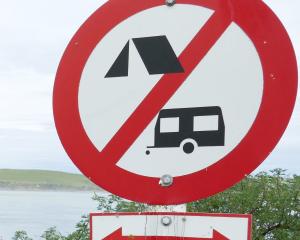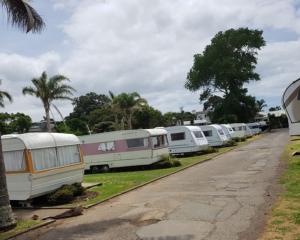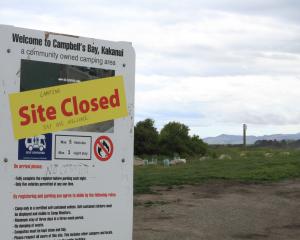However, supporters of the relaxed new approach have hit back, saying opponents' concerns for their businesses should be rejected.
The debate came as the council's hearings committee prepared to consider submissions on its new ''responsible'' camping policy and bylaw next month.
The new approach relaxed tougher rules introduced in 2011 by providing greater freedom for tourists with camper vans.
That included scrapping a rule prohibiting more than two self-contained camper vans - those with toilets - parking within 50m of each other, and allowing vans with facilities to camp for up to two nights on sealed areas of reserves and other public land.
Another rule forcing camper vans without toilets into public camping grounds would be relaxed, allowing stays of up to two nights at car parks with toilet facilities, at Macandrew Bay and Ocean View.
The changes were endorsed for consultation by councillors earlier this year, and have attracted public 15 submissions, mostly in favour of the changes.
However, some Dunedin holiday park owners criticised the new approach, fearing their businesses could be hurt, submissions showed.
Dunedin Holiday Park owners Rex Moss and Daniel Grubb said they supported freedom camping in rural areas, but opposed the relaxation in Dunedin because the city already had holiday park facilities.
Their company employed up to 15 staff and paid the council $40,000 a year in rates and other charges, but now faced the prospect of the council using its rates take to provide free alternatives for campers.
''Yes, these people spend their money in the city, but why shouldn't we get our little bit, as well?''The last thing we need [is] the council undermining our businesses.''
Portobello Village Tourist Park owners Kevin and Sherryl Charles - who paid $15,000 a year in rates and other council charges - also opposed the changes.
Operators had experience dealing with visitors and the types of problems they encountered, and could more effectively promote the city's attractions, they said.
Dunedin ratepayers should not be ''subsidising holidays for tourists'', but camping ground owners deserved compensation from the council if the change went ahead, they said.
Council staff, responding to the submissions, noted freedom camping was ''not going to go away'' and the changes would cater for people who would ''never go to camping grounds''.
Another submitter, David Barnes, urged the council to ''reject outright'' the complaints of camping ground operators, whose concerns ''are based on an attempt to corner a market''.
''If camping was to be restricted as they propose, the next logical step would be to ban picnicking at Macandrew Bay or the Esplanade because people should be using the local cafes.''
The council's proposals won support from the Department of Conservation, while the New Zealand Motor Caravan Association supported the ''general thrust'' of the changes.
However, a two-night maximum stay should be increased to three nights for self-contained vehicles, which could accommodate the increase, NZMCA resource management planner James Imlach said.
The change would allow more time to explore an area - increasing the benefits for local businesses - without damaging the environment, he said.
Macandrew Bay Boating Club commodore Tony Macrinowski was concerned at plans to promote the car park beside the club as one of two camping spots for camper vans without their own facilities.
He said the car park was already near capacity during busy periods, and yachties needed room to rig and manoeuvre their boats.
''To legislate another use for an already-strained facility seems ill-conceived and lacking in foresight,'' he said.
Freedom campers should use parks opposite nearby Ralph Ham Park, where toilet facilities were located, he said.
The council hearings committee - chairwoman Crs Kate Wilson and Fliss Butcher, and Waikouaiti Coast Community Board member Mark Brown - will consider submissions on August 5-6.







